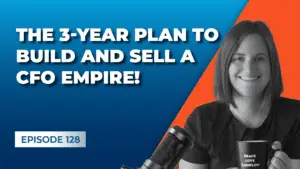
There’s an old expression that says if you want to find the answers to something, follow the money. A common mistake in businesses is thinking of financial matters as something that happens only in the accounting department. But if you follow the money across all the purchase orders, invoices, and other dealings in your company, you’ll soon see that accounting practices affect everyone, not just the accountants.
Today, we will examine some common accounting mistakes and ways your company can address them. The steps outlined in this episode can be implemented across your company, creating a rich matrix of accountability and safety. If you can implement company-wide changes to track and simplify all expenses, you will see real results in your accounts.
On this episode you’ll hear:
- How to set up a company-wide approval matrix
- Ways to address purchase price variance
- Ways to spot fake invoices
If you’re ready to implement some accounting practices that will make an impact across your entire company then this is one episode you won’t want to miss!
Resources
Transcription of This Episode
The Gross Profit Podcast is your one stop shop on the path to profitability. Each week, we share authentic advice on the positive, practical steps you can take to make the company you love more profitable. If you’re looking for a positive plan to help you avoid common spending mistakes, control costs, and increase your profits, then this is the place for you.
I’m Ryan Cowden and this week we’re joined by our host James Kennedy and Garret Carrager. In this episode of the Gross Profit Podcast, James and Garrett discuss three common accounting errors, and the changes you can make to address them.
There’s an old expression that says, “If you want to find the answers to something, follow the money.” A common mistake in business is thinking of financial matters as something that happens only in the accounting department, but if you follow the money across the purchase orders, invoices, and other financial dealings in your company, you’ll soon see that accounting practices affect everyone, not just the accountants.
Today, we will examine some common accounting mistakes and ways your company can address them. The steps outlined in this episode can be implemented across your company, creating a rich matrix of accountability and safety.
If you can implement these company wide changes to track and simplify all expenses, you will see real results in your accounts. On this episode, you’ll hear how to set up a company wide approval matrix. An Approval matrix is the system by which your company approves purchases and other expenses. By implementing a sound approval matrix or making sure everyone understands the way it works, you will have a more accurate understanding of your finances and reduce the risk of fraud.
Next, James and Garrett, will discuss some ways to address purchase price variance. Purchase price variance occurs when the final invoice includes a different price than what was initially agreed upon. While this can happen for various reasons, there are ways to track such variance and account for it in future dealings with these customers.
Finally, James and Garrett will discuss how to spot and respond to fake invoices, requests for money transfers, secret purchases, and changes to invoice details should all raise red flags and should be dealt with by directly contacting your customers.
If you’re ready to implement some accounting practices that will make an impact across your entire company, then this is one episode you won’t want to miss. There’s a lot of actionable advice in this episode, so grab something to write with because you’re going to want to take notes. As always, I’ll be back on the other side to wrap up any loose ends.
Without any further ado, here’s our conversation with James Kennedy and Garrett Carrager.
Welcome to another episode of the Gross Profit podcast. My name is James Kennedy. I’m CEO at the ProcurementExpress.com, I am joined by my partner and co-author of a book we’re writing on improving profitability in your organization, Garret Carrager. Hi, Garret, how are you today?
All good James. All good. Keeping it real and still working way hard at the accountancy and learning something new everyday. “Everyday is a school day,” as they say.
Everyday is a school day. Exactly, yeah. We have one of the chapters we’re working on here is all about the sort of improvements that are within the wheelhouse of the accountancy team. And we have picked out three for me to discuss with you today. Let’s just dive into it. The first one is approval matrix. What’s an approval matrix and what’s that got to do with spending hours?
Well, the approval matrix is where you set up spend by person and also spend by different levels. What you want to have is that different people can sign off on different levels of spend. And what this does is this make sure that the company is not liable and doesn’t get into a position where it has agreed to pay or has agreed for certain work or products to be done and they can’t actually afford to pay it in the end of the day or that we can’t actually bill it out.
This is key to any business, and a lot of businesses actually don’t have this, a lot of bigger businesses should and probably do have it, but it’s super important for every size of business to make sure that they understand the approval metrics, who approves at what level. Small spend on stationery and maybe on items that might’ve gone from petty cash. That can really be approved by someone at a lower level or can be approved by many people.
As you move up the chain and maybe you’re buying products or services or maybe ones that are recurring, they can be again, approved by the purchasing department who will just set up and approve these on an ongoing basis because this is a current spend that’s going to be sold as part of our goods that are going to be sold each month and each day.
But when you move to higher spend then, for one off project, that’s really where you get the CEO involved such as on capital spend or a high value one-off spend.
If you were going to buy, again, a contractor in to build an extension to the premises. You’re buying some kind of specialized vehicle that costs a lot of money and maybe can’t be resold too easily and it’s going to be a cost to the business long term. These are where you need to get to the people in. These really are really to help reduce fraud, make sure we understand what we have signed up to pay in the future and to help or keep our costs down by everyone knows what we spent and if there’s a target, someone might at that stage say, “Look, why don’t we spend, why don’t we buy this elsewhere or whatever.” You know?
I mean, there’s a certain amount of you need to be able to cover your ass on this as well. I mean it must be pretty terrifying to be working on the finance team. Someone rings up and says, “I need a PO for 10 grand for whatever.” Unless you have staff coming in and out of the organization. How are you supposed to know whether they can order that or not? Especially if you come into a new finance team or you have your finance teams changing, you’re suddenly expected to raise POs, which I guess at the end of the day, the buck stops with whoever raises the PO, right? So that could be you.
That could be you and in fact, a business I worked in recently, we had over 3,000 employees. I know this sounds amazing, but three thousand employees and they did not have a PO system. So people were locally buying from different suppliers at different prices, they were buying off their own bats. So basically they were just saying, “I need this, I need that.” The accounts department weren’t seeing any POs coming in, so they didn’t understand what cost they need to accrue, and what cost they needed to be aware of that were coming into the future. And this could affect the cash flow and also affect the accuracy of the monthly management accounts, you know, so a serious issue for operations, serious issues for the accounts department and serious issues for the management who are trying to run the business.
So at that stage, what I actually did in the business was to bring in Procurement Express software, roll that out across the business. And that immediately meant that POs were being issued to all our suppliers. We could immediately see what was being purchased, when, what spend we had committed to.
And also then finally, amazingly, and it was a bit of a culture shock, I’m not going to lie to you James, for a lot of the people, we had an approval matrix. So this meant you could no longer go off off your own bat and just buy a new laptop or buy yourself a nice leather suitcase or whatever you wanted to buy and say, “I needed this for work.” You actually had to go put in what you needed, it would go to your manager and your managers have to sign it off. If it was a higher spend, it’d go to that person’s manager. And if it was a higher spend again, it would finally go to one of the directors to sign it off. So this had a huge immediate and beneficial effect on the business, allowing us to make accruals, get our accounts right, understand our spend, and really see what was going on in the business for the first time ever, you know?
Garret, it’s terribly, terribly embarrassing that Procurement Express should turn out to be so useful in that scenario. If I had known that was how you were going to answer, I might have been more modest about it. That’s it, it’s on the record now. Procurement Express is amazing for your business. There’s nothing we can do about it. So let’s move on to the next one, which is PPV, what is PPV?
So PPV for our non-accountant listeners is purchase price variance. So what that means is if I go and I set up a PO to buy some product and I say, “I’m going to buy 10 of these items, and each of these items is going to cost me $500.” So I say I’m creating a PO. So quantity 10 price 500 so that’s $5,000 is the total spend. What happens then is the product comes in, I get 10 of them and everything’s good. I logged them into the system on a receipt [inaudible 00:08:53]. The next thing, two later, or a lot quicker now I suppose by email, but in comes the invoice and the invoice says, yes you’ve got 10 of these items but we charged you, instead of charging you 5,000 we’ve charged you 5,250 so your purchase price variance is actually the 250. It’s the difference between what the PO was raised for, 5,000, and a final invoice amount which is five to five o.
So what is the 250? Well the 250, in a lot of cases, is probably carriage. That’s what it usually is. So it might be something like carriage or some other expense. Sometimes it can be accessories or sometimes they can actually charge you a higher price. So say they charge you at 500 quid for each of the items. They might have charged you five two five, or whatever it is, per item and that’s where you have a variance and what you need to do in that case, is you need to understand and get it behind that variance because this is where you lose money and this is where you lose profit because someone in operations has raised that invoice, raised the PO sorry, and they expected to pay 5,000 so now if they’re paying 250 quid more, they either need to charge that out to the customer or they need to understand that their profit is going to be down by 250 quid in the [inaudible 00:10:10] and when everyone is on a bonus to hit their budget, that 250 quid can really matter.
Yeah, and a small change there could totally wipe our your profits. On your five grand, you might only be making $500, so 250 out of that wipes out half your profit. That’s why you have to keep an eye on it. So do you get into an argument with the ops teams saying, when you come back, saying, “Yeah, you thought your budget was X but it came in more expensive.” Are they blaming you? Are they just trying to be more careful next time? Are you there for the discussions about their bonus?
Well, the whole thing of finance, the only thing we can see is to try and provide information to the business to help the management steer the business in the right direction, help operations make the right decisions.
I’ve currently, I’ve just joined a new business where I’m really making a big impact there where they didn’t really have this information previously and now everyone comes up to me now every month to find out what’s going on and why their costs are higher, why they’re not making money. And I can actually go back through their business model and help them understand where they’ve lost money and where people are going out and doing work and we’re not charging enough for it. See, this can be particularly problematic in a business where you have a service lead business and you have people going out, where if you start losing money there, you have time that’s not billable, then you start losing money pretty quick and it can really spiral out of control.
So it’s not really about hammering them, but it is about making, letting them know and helping them to understand where they’ve lost the money. So the next time they will actually bill it in to the, good manager will bill it in so the manager would go, last time I charged it, the client, seven and a half grand, I thought I was making two and a half grand profit on that. But actually I lost 250 quid in carriage and, or whatever, I lost it on. So now I know next time I’m going to bill that on so next time instead of charging them seven and a half, I’ll charge them [inaudible 00:12:01] and make sure I cover myself off there nicely and it’s a nice margin there for the business, gross profit margin for the business, you know?
This is for the ops people, I guess, the real time access to that budget information is key, right? ‘Cause if it’s come, you find out two months later, the horse has bolted. But if you figure out that there’s extra costs coming in earlier at least you can go back quicker to the supplier. They probably care most about the timeliness of the data, but the finance team doesn’t always want to be held down to providing real time data, right? This is kind of the discussion I have with my finance team all the time, about how quickly we can get the numbers out. So they on your case to produce those numbers real time or is that a reasonable expectation or what do you? Do you say, “No, I’ll do it once a month. Once a week.”?
So the PPV you could probably track that using Procurement Express and the manager could see that in there that there’s been a PPV on a particular item that he’s purchased. But in relation to doing the accounts is some people do think it’s as simple as pressing a button, but actually it takes a while to prepare and get the numbers correct. So what can usually happen is it usually takes, you have a close off at the, you might have a four four five weekly reporting or you have a calendar month.
So, your calendar month, you say the close off now is the 31st of July and then you say we will leave three days after that to, for all our invoices to get posted in from suppliers and after that we have a close off and then it’s up to finance to put all the numbers to get a report within three or four days after that.
So that’s usually the way it works is it is quite hard to do any kind of real time information, but it should be real time fracking on the invoices, on PPVs. They should really be reviewed daily, and any large PPVs need to be tackled quickly.
Great. Okay. Well let’s move on to a very popular topic in the news, which is fake invoices. Have you ever been caught out Garret Carrager, by a fake invoice?
I’ve never been caught out. I have seen some but I’ve never been caught out. Some of them, they coming now as fake emails and invoices and are quite impressive actually.
The last company, the last business I worked for was a multinational business and one of the businesses, or branches, in, I think it was in Bulgaria, it actually received an email that allegedly came from the CEO of the whole business asking them to transfer money that he was going to buy, the whole company was going to buy another business in Bulgaria. So you can imagine he was looking for a significant amount of money. Now this is a massive business and they have a lot of money. So them buying another big business, you know, for 20 million is not unheard of. But it was phrased in such a way that the email address looked like it was coming from the CEO and was phrased in such a way, you might say, “Well, why didn’t they just make, or say it to other people?”.
But what happened, and what happens I think is quite common in these emails is that they have it that it has to be a secret. And the secret in this reason was, of course, is the company was listed on the stock exchange and you can’t make public information that would affect the stock price. You have to make it public at once to everyone. So he didn’t want this information getting out there, we’re going to buy another business until he made it public to the stock exchange in the proper manner, otherwise he’d be in trouble. A bit like Elon Musk when he was tweeting there while saying he has someone else lined up to buy the business and bring it private, and he got in trouble there with the SEC in America.
So in this case they weren’t sure about, they were looking at the email going, “Really? Does he really need 20 million transferred to this account?” It all looks a bit strange. So they rang up the financial director of the whole group of companies just to check with him. He then contacted the CEO, and the CEO said it didn’t come from him at all and the whole thing was a ruse and we were just notified then throughout the business to keep, in finance, was not notified throughout the whole business in all the countries to keep an eye out for these kind of things.
So I suppose they’re very sophisticated, but the return for the businesses, the return for the fraudsters is super high. The amount of money they can get back is astronomical.
Wow. That’s sometimes called bogus boss fraud, a super common, super, super common. Actually my business partner, Richard, used to work as an IT, around an IT support business, and he would get at least two or three emails a week with a similar story. People asking the IT guy about this email address, was it legit?
So Garrett, out the last five fake invoices that you paid, how many would you admit to?
I never pay any because I always use a PO. And if I don’t have a PO number on it. I don’t pay it. It’s as simple as that. Even some of them that have Pos, I don’t mean pay them. But the main thing I would always check is, does it have a valid PO number? Has the goods or services been receipted in?
And then you could do your three-way matching. Which is, does your invoice match the PO? And then does, or you start off with the PO, so does your PO match the invoice? And does the invoice match the goods received note? So, you’re checking values and quantities across all three, and any variances there should raise a red flag immediately and you need to look into them, and don’t pay it until you understand what’s going on.
You also get a lot of companies who will send you in an error saying, “I want to change our bank details have changed to X, Y or Z.” You could end up paying some money for a few months or whatever before realizing the other company, the real company rings up and says, “Why haven’t you paid us?” And you say, “Well, I have been paying you.” And they say, “Well, no you haven’t.” And then you check the bank details, and the letter you received, and it was actually all fake and it was going to another fake account.
So that’s another thing where anytime we get a letter in for change of bank details, it must be checked by at least two people in our business and then we ring directly to the other business and ask them have they sent us in a change of bank details request. And sometimes you find out they haven’t, you know. So it’s all about being cautious, checking and understanding, does it make sense? It’s just common sense comes into play?
All good. So these are just three of the topics that we covered. We went over the approval matrix, PPV, fake invoices, we go over a range of other issues you should watch out for including transposition, AIPV, other fake emails, not accruing things and a range of other tips in the book. You can get a book at book.www.procurementexpress.com get a free chapter, where you can download it.
Garret, thank you very much. You’re a gentleman for sharing your vast knowledge and experience with the audience. Thank you very much.
No worries, thanks James. Talk to you again soon.
All right.
All right, folks. There you have it. That wraps up our conversation with James Kennedy and Garrett Carrager. They shared a ton of valuable insights and advice today on three common accounting mistakes and the ways you can prevent them from disrupting your own company. We’ve also shared some tools and resources, which will all be linked up in the show notes. Don’t forget to click on one of those links to get a free chapter from the book, Profit Leaks, by James and Garret.
I hope you enjoyed our conversation. Please consider subscribing, sharing with a friend or leaving us a review in your favorite podcast directory. Until next time, best of luck in all that you do and we’ll look forward to seeing you on the next episode of the Gross Profit podcast.




